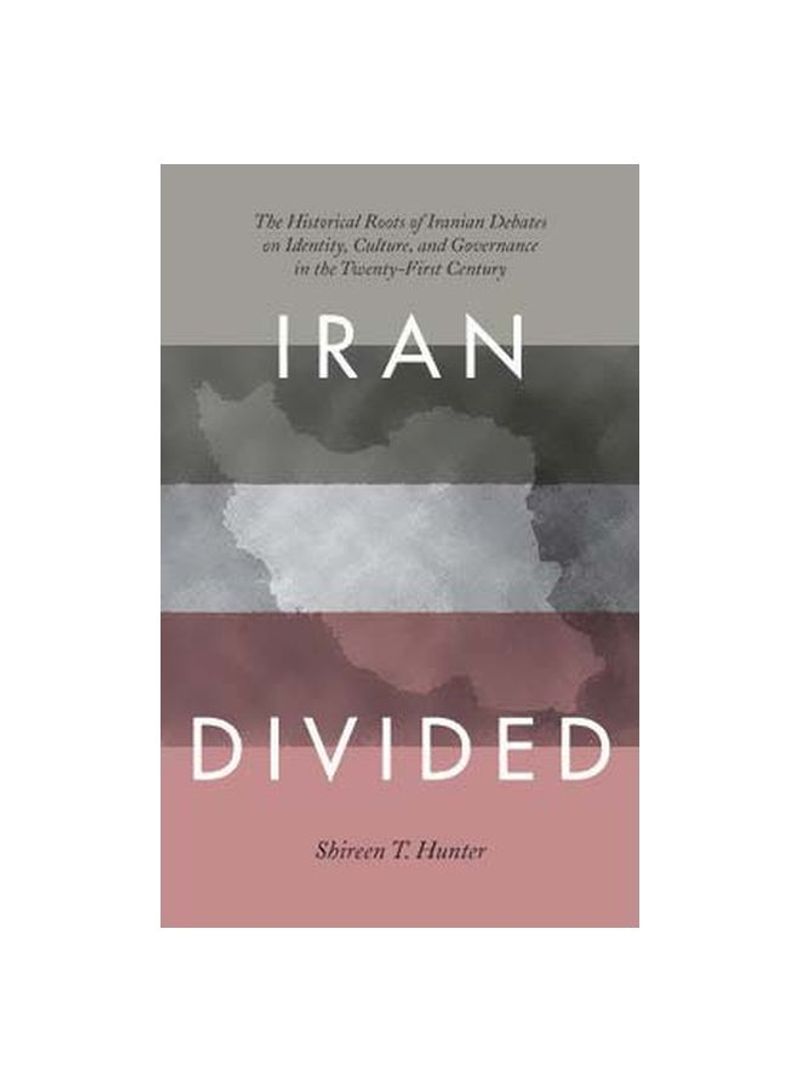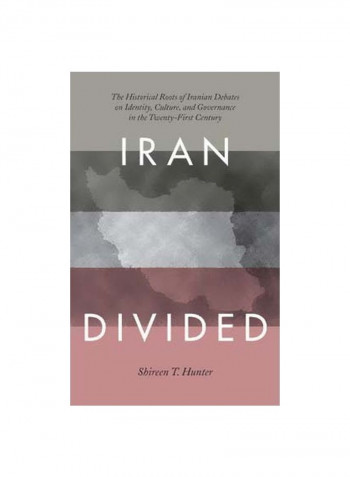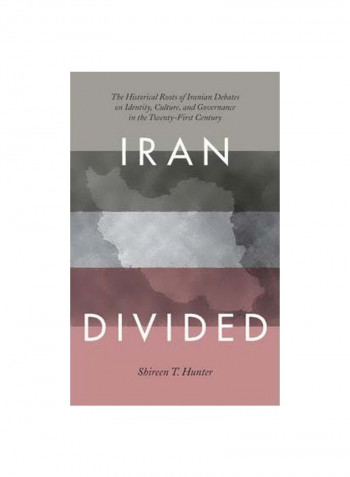Sort by
Rating
Date
Specifications
Author 1
Shireen T. Hunter
Book Description
Iranian politics has been marked by sharp ideological divisions and infighting. These divides, kept largely out of public view until the 1990s, came to greater light with the contested 2009 presidential elections. To explain the diverse and complex forces that led to this event and that animate Iran's current fractured society and polity, author Shireen T. Hunter looks beyond the battle between the forces of reform and reaction, democracy and dictatorship, and considers the historic forces that created the conditions faced by Iran since the revolution. Iran Divided: The Historic Roots of Iranian Debates on Identity, Culture, and Governance in the 21st Century explains historical and political factors and their relevance to Iran today, shedding light on the forces behind Iranian politics and society. This book discusses: *historical roots of Iran's current divisions and debates; *Iran versus Islam; *secularism versus religion; *constitutionalism versus Islamic government; *fundamental issues of identity, culture, and governance; *aging of the revolutionary coalition; *development of new elites; *experiences of the Islamic republic; *and new international conditions moving the country beyond old divides and ideological rifts toward a new national consensus. A comprehensive survey, the book will be an indispensable tool to any student seeking to understand the Islamic Republic of Iran and its standing in the world today.
ISBN-10
1442233192
ISBN-13
9781442233195
Language
English
Publisher
ROWMAN & LITTLEFIELD
Publication Date
16/Oct/14
Number of Pages
272
About the Author
Shireen T. Hunter is a research professor at the Prince Alwaleed Bin Talal Center for Muslim-Christian Understanding at Georgetown University.
Editorial Review
This wide-ranging book covers sociopolitical and cultural developments in contemporary Iran. Hunter, a well-published scholar on Iran and the broader Muslim world, places contemporary developments in postrevolutionary Iran in historical context. Throughout the book, the author seeks to explain what it means to be an Iranian and how the Iranian people define and redefine their cultural identity and grapple with issues of governance. Hunter traces the current debates about the issues of modernity, cultural authenticity, and political discourse among the Iranians from the dawn of the 19th century. She describes Iran's encounter with the West and explains varied responses to this encounter, including those of nationalist, leftist, and religious groups. The strength of the book is that the author does not offer simplistic explanations to complex problems that have affected the course of political developments in Iran, prior to and after the establishment of the Islamic Republic of Iran. The author also does a masterful job of analyzing the interplay of competing forces that have shaped the formation and maturation of the Islamic Republic and explains major developments in Iran from 1979 to the present time. Summing Up: Highly recommended. Upper-division undergraduate, graduate, and research collections. * CHOICE * This is the best book yet published regarding the history and politics of Iran since 1979, which marked the rise of the Islamic Republic of Iran. Hunter brings equal focus and balance to her discussion of four significant periods: the ascendency of leftist forces from 1970 to 1997 under Hashem Rafsanjani; the Left's revenge under Mohammad Khatami, 1997-2001; continuing polarization under Khatami, 2001-05; the rightest revenge under Mahmoud Ahmadinejad, 2005-13. There is also a concluding chapter on the election of Hassan Rouhani in June 2013. Hunter examines the important dichotomies of Iran's politics during these periods: between pre-and post-Islamic society, Arab and Iranian culture, Arabic and Persian languages, Iranianism and Arabism, Iranian-Turkic (Azeri) and Kurdish culture, Shi'ism and Sunnism, monarchy and republicanism, and Islamism and secular democratic constitutionalism. The author thinks that the growing connection between ideology and discourse has hardened the ability of Iran's political elite to make the concessions necessary for a governing consensus. She thinks such consensus necessary if Iran is to meet the institutional, economic, and geopolitical challenges it faces, especially regarding relations with the US and Europe and with the Sunni Arab states of the Middle East. Summing Up: Highly recommended. Upper-division undergraduate, graduate, and research collections. * CHOICE * Iran Divided ultimately determines that the current system of governance is stable and process-driven, with its Islamic leaders pursuing many aspects of modernity, including constitutionalism and republicanism. * Middle East Journal * By placing Iran's recent developments in their proper historical context, Hunter identifies a number of major divides in Iranian identity, culture and politics, some resulting from Iran's long and turbulent history and some from its more recent past, especially the dynamics of its modernization. Applying this approach, Iran Divided goes beyond the simplistic and binary analysis of Iran's politics in terms of factional infighting, conflict between reformists and conservatives, and struggle between dictatorship and democracy. Hunter also sheds new light on the country's pre-and post-revolution developments. The result is a rich and valuable addition to Iranian studies and for a better understanding of Iran's modern politics. -- Hooshang Amirahmadi, professor, Rutgers University; senior associate, Oxford University; president, American Iranian Council Shireen Hunter takes on one of the most persistent and difficult questions facing Iranians: Who are we and what makes us Iranians? In doing so, she skillfully weaves threads from history, ethnography, religion, and literature, and applies her remarkable scholarship to a problem that continues to bedevil Iranians even as their political systems change. -- Ambassador John Limbert, professor of Middle Eastern Studies, US Naval Academy Shireen Hunter has provided the most authoritative analysis of contemporary Iranian political and social dynamics in print today. Her detailed data-rich study provides up-to-the-minute accounts of the most recent Iranian political events and their meaning both for Iran and the world. Contextualizing these latest events in the contemporary history of Iran starting with the history surrounding the Iranian Revolution of 1978-79 and the subsequent establishment of the institutions of the Islamic Republic, she demonstrates definitively that governance in Iran today is process-governed and stable. Of special mention is the admirable examination of the 2009 presidential election and the social protests emanating from it; and the subsequent election of reformist President Hassan Rouhani in 2013. Those who believe that Iran is an arbitrary theocratic dictatorship should be required to read this masterful study; their prejudicial, inaccurate view will be severely challenged. -- William O. Beeman, Professor, Department of Anthropology, University of Minnesota Shireen Hunter's new book is a fascinating survey of Iranian factional politics. She traces the essential divisions back to the earliest days, and presents them to the reader in a graceful and accessible style. The politics of the Islamic Republic, she argues, is rooted in the discourse of pre-revolutionary Iran. This is a book for anyone who would like to penetrate the thickets of Iranian politics, and perhaps even gain a perspective of where it may be headed. -- Gary Sick, Adjunct Professor of International and Public Affairs Senior Research Scholar, SIPA, Columbia University and former NSC official under Carter Administration



